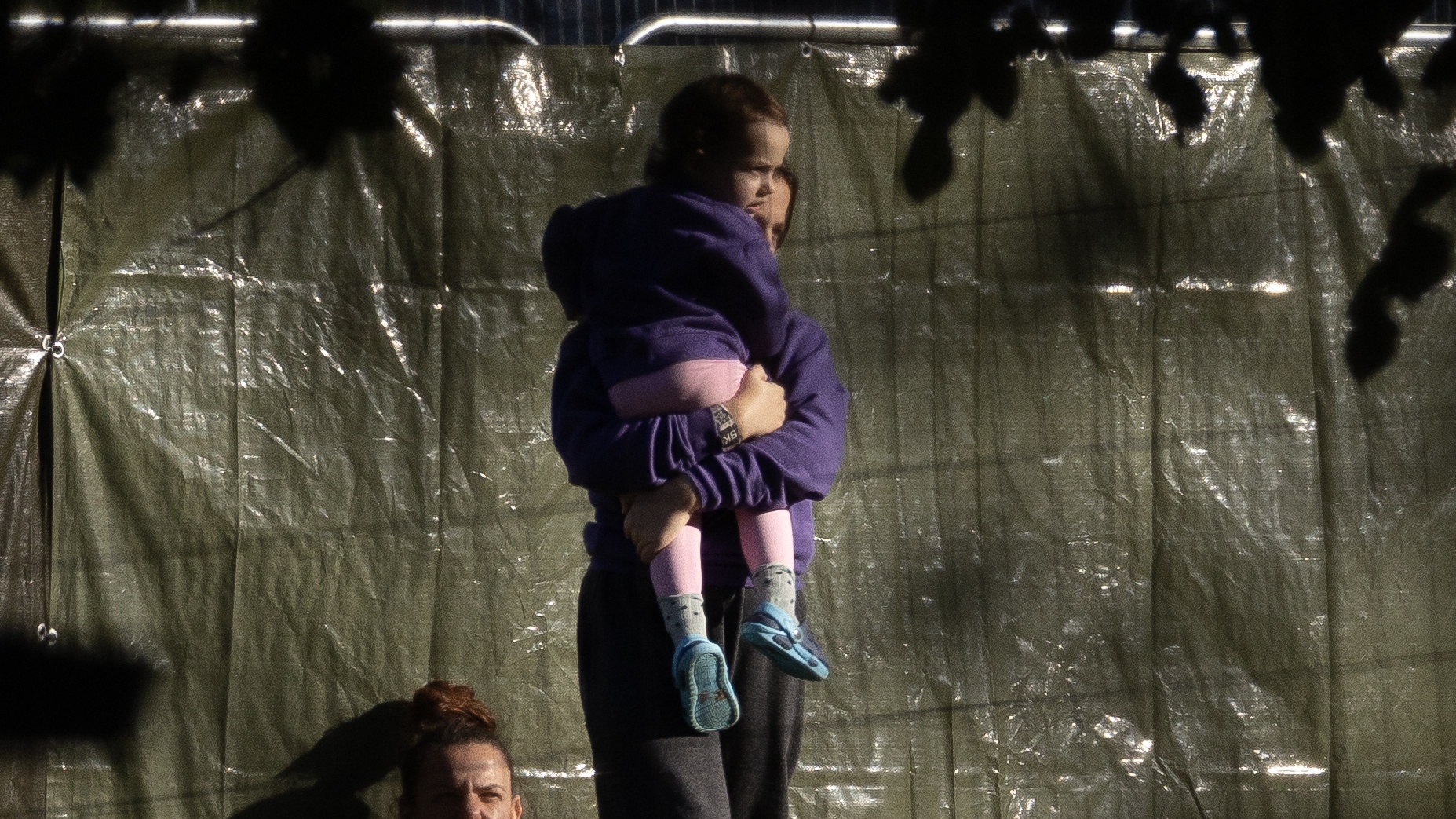Manston asylum centre: what’s meant to happen and what’s gone wrong?
Migrants are being held in overcrowded and squalid conditions at a processing centre in Kent

A free daily email with the biggest news stories of the day – and the best features from TheWeek.com
You are now subscribed
Your newsletter sign-up was successful
Thousands of asylum seekers have been moved from the Manston processing centre in Kent after weeks of headlines criticising the dangerous overcrowding and inhumane conditions there.
The BBC reported that “more than 2,000 migrants” have been removed from the site following several news reports of people being held in conditions that have led to outbreaks of diphtheria, scabies and MRSA.
Home Secretary Suella Braverman has been fiercely criticised for her role in the overcrowding at the site. Last week, The Times reported that she had been told “at least three weeks ago” that “migrants were being detained for unlawfully long periods” at the centre. This had put the government in breach of the law and the matter “needed to be resolved urgently by rehousing the asylum seekers in alternative accommodation”.
The Week
Escape your echo chamber. Get the facts behind the news, plus analysis from multiple perspectives.

Sign up for The Week's Free Newsletters
From our morning news briefing to a weekly Good News Newsletter, get the best of The Week delivered directly to your inbox.
From our morning news briefing to a weekly Good News Newsletter, get the best of The Week delivered directly to your inbox.
What is the Manston migrant centre?
Manston is an asylum processing centre in Kent designed to hold “between 1,000 and 1,600 people” a day as they underwent security and identity checks, with those checks to be completed “in under 24 hours”, said the Home Office in late October. The centre, at the Manston airfield near Ramsgate, was opened in February of this year to address what inspectors called “unacceptably poor conditions” at a processing site in Dover.
After asylum seekers have been processed at the centre, they are then “supposed to be moved into the Home Office’s asylum accommodation system”, said the BBC, which “often means a hotel” because of a “shortage of available accommodation”. But some are taken to immigration detention centres “if the government believes it has a case to remove them” from the country.
At the end of October the Manston site held “around 4,000 migrants”, said Sky News, which is “more than any UK prison population”. Many had been held there for far longer than 24 hours owing to problems in finding accommodation – ITV reported that “some have stayed at Manston for as long as four weeks”.
Immigration minister Robert Jenrick told MPs this week that the number of people held at Manston had been reduced to “below 1,600”.
A free daily email with the biggest news stories of the day – and the best features from TheWeek.com
What are conditions like?
Earlier this month, a report by the Prison Officers’ Association (POA), representing staff working on the site, detailed “concerns” about the conditions at Manston.
The report said there were days when the facility had “run out of food and drinking water for residents”, and described “inadequate” laundry facilities and cleaning regimes. It also said that “mould and bacteria” had been developing in overcrowded and damp marquees sheltering migrants.
The Guardian reported in October that overcrowding had led to an outbreak of diphtheria among residents at the site, which followed a previous outbreak of norovirus, “while scabies is widespread”, said the paper. At least one case of MRSA has also been identified, said the paper.
Footage obtained by the Sunday Mirror earlier this month showed the “squalid” conditions inside, with “detainees sleeping on mats on the wooden floor of a marquee” as temperatures outside plunged. One whistleblower told the paper: “It’s cramped, with people sleeping on wooden floors under thin blankets. Some are there for 25 days.”
One 29-year-old who had been held at the centre after being smuggled into the country from Eritrea described to Sky News how he had been unable to have a warm shower during his four days at the immigration centre, and a typical diet consisted of “cake for breakfast, hot dog for lunch and for dinner chips”.
What has led to the overcrowding?
Overcrowding at Manston is in part due to the huge backlog of asylum claims waiting to be processed, which numbers almost 100,000. While a rise in claims since 2019 has contributed to the backlog, a Home Affairs select committee report published over the summer said that “antiquated IT systems, high staff turnover, and too few staff” were contributing to the slow processing of claims.
The Times reported that Braverman, the former attorney general, had failed to act on legal advice that migrants and asylum seekers were being held at the site for an unlawful amount of time. A source also told the paper that Braverman had “deliberately” chosen not to sign off on hotels for people being held at Manston to be transferred to “in an attempt to reduce the £6.8 million a day bill being paid by the government to house asylum seekers”, said the paper.
A Home Office spokesperson denied that legal advice given to Braverman was ignored.
Sorcha Bradley is a writer at The Week and a regular on “The Week Unwrapped” podcast. She worked at The Week magazine for a year and a half before taking up her current role with the digital team, where she mostly covers UK current affairs and politics. Before joining The Week, Sorcha worked at slow-news start-up Tortoise Media. She has also written for Sky News, The Sunday Times, the London Evening Standard and Grazia magazine, among other publications. She has a master’s in newspaper journalism from City, University of London, where she specialised in political journalism.
-
 Where to go for the 2027 total solar eclipse
Where to go for the 2027 total solar eclipseThe Week Recommends Look to the skies in Egypt, Spain and Morocco
-
 The end of mass-market paperbacks
The end of mass-market paperbacksUnder the Radar The diminutive cheap books are phasing out of existence
-
 Political cartoons for February 22
Political cartoons for February 22Cartoons Sunday’s political cartoons include Black history month, bloodsuckers, and more
-
 ICE eyes new targets post-Minnesota retreat
ICE eyes new targets post-Minnesota retreatIn the Spotlight Several cities are reportedly on ICE’s list for immigration crackdowns
-
 How corrupt is the UK?
How corrupt is the UK?The Explainer Decline in standards ‘risks becoming a defining feature of our political culture’ as Britain falls to lowest ever score on global index
-
 How did ‘wine moms’ become the face of anti-ICE protests?
How did ‘wine moms’ become the face of anti-ICE protests?Today’s Big Question Women lead the resistance to Trump’s deportations
-
 The UK expands its Hong Kong visa scheme
The UK expands its Hong Kong visa schemeThe Explainer Around 26,000 additional arrivals expected in the UK as government widens eligibility in response to crackdown on rights in former colony
-
 How are Democrats trying to reform ICE?
How are Democrats trying to reform ICE?Today’s Big Question Democratic leadership has put forth several demands for the agency
-
 Minnesota’s legal system buckles under Trump’s ICE surge
Minnesota’s legal system buckles under Trump’s ICE surgeIN THE SPOTLIGHT Mass arrests and chaotic administration have pushed Twin Cities courts to the brink as lawyers and judges alike struggle to keep pace with ICE’s activity
-
 700 ICE agents exit Twin Cities amid legal chaos
700 ICE agents exit Twin Cities amid legal chaosSpeed Read More than 2,000 agents remain in the region
-
 House ends brief shutdown, tees up ICE showdown
House ends brief shutdown, tees up ICE showdownSpeed Read Numerous Democrats joined most Republicans in voting yes